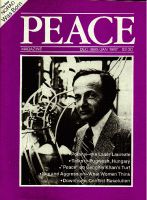
Peace Magazine Dec 1986-Jan 1987, page 26. Some rights reserved.
Search for other articles by Peter Dale Scott here
PETER DALE SCOTT is a Professor of English at the University of California, Berkeley, a Canadian, and a peace activist. He spoke on tape with our editor this summer about the circumstances in which NORAD had received approval. We present his account verbatim, since it amplifies an incident already told by George Ignatieff in his memoirs, The Making of a Peacemonger, U.of Toronto Press, 1985. (Ignatieff names Generals George Pearkes and Charles Foulkes as implicated in this manoeuvre.)
"In 1957 I joined the Department of External Affairs. My first assignment was to Defence Liaison I, which generally speaking, handled the ordinary matters that involved both External Affairs and the Department of Defence. I want to talk about what happened to NORAD when I was there as a very junior person. I should make clear that what I am reporting is, as will be evident, in a sense hearsay, but I have no doubt as to the factuality of what actually occurred. I worked under two superiors: Immediately above me was a man called McCardle, who has just retired as the Canadian Consul General in San Francisco, so I have seen him until very recently. Above him was a man called, I think J.W. McCordick.
As I remember it, it was an afternoon when McCordick came back, quite white and ashen-faced from having just seen Prime Minister John Diefenbaker, who had only been elected a few weeks before. Although technically he was his own Secretary of State for External Affairs, he was very new in power, very new to the responsibilities of the prime ministership and had not really paid any direct attention to External Affairs at that time. What McCordick had just learned, as he reported to us, was that a General, a very famous Canadian General--probably the chairman of the Canadian Joint Chiefs of Staff--I don't remember at this point--had shortly before gone to the Prime Minister with a sheaf of papers to be signed. He'd said, these are things that were worked out by the Liberals before you came to power, but they still need a signature. The Prime Minister signed them, as I understand, without really questioning them. And among the things that he had signed without really knowing it was the NORAD agreement. I'm not quite sure of the sequence of events here, but I understand that people from External Affairs, possibly McCordick himself had said: 'Well, that hadn't been cleared with External Affairs.' Because under the Liberals the Department of External Affairs had had a lot of very serious objections to the NORAD agreement as it had been drafted, and it was precisely for that reason that it had not been signed. It was still supposed to be under negotiation. What had happened, in effect, was that this General had pulled an end run. He had gone directly to the Prime Minister, got his signature and thereby, without any further debate, had in a sense got rid of the objections which were being raised by the Department of External Affairs. And somebody put very forcefully the objection that this was supposed to be cleared through the Department of External Affairs before it went to the Prime Minister. The response from the Department of Defence was: Well of course it did go through the Department of External Affairs because the Prime Minister was simultaneously the Secretary of State for External Affairs.
I know that there was a feeling of deep resentment and serious concern. It was not just a matter of turf, of pride in one's own involvement in things. It was that there were very serious problems about the NORAD agreement and I believe that the feeling in External Affairs was that far too much Canadian sovereignty was being given away without anything in return by this NORAD agreement. I may be wrong on that, but that was certainly the impression I had at the time. I certainly had the impression at the time that the people in the know about this were very, very few, and only by accident included me, because I was physically in the corridor when the news came down. [One had] a feeling that this had been a very important day--really very sneaky and a form of bureaucratic cheating, in effect, had been done. I'm bringing this up now because I feel that in NORAD we have a treaty that gets renewed because it was originally agreed to, but that really it was never agreed to. It was agreed to, of course, by the military because they like to play around in expensive American airplanes... and so on, but it was never agreed to by External Affairs and we are just perpetuating this situation. I hope very much that the next time that the treaty comes up for renewal, there will for the first time be a profound debate as to whether Canada should be in it."

Peace Magazine Dec 1986-Jan 1987, page 26. Some rights reserved.
Search for other articles by Peter Dale Scott here